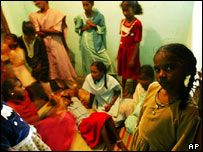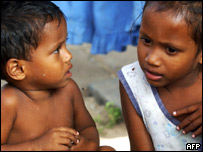
|
|||||
|
| |||||
Saving Asia's Tsunami Orphans
The most vulnerable victims of the tsunami remain the children, many of whose parents were engulfed when the waves struck. The orphaned children - those who have lost either a father or a mother, or both parents - cannot yet be numbered but estimates put them in their thousands. Aid groups, international organisations and governments are now attempting to protect and provide for them as they glue together the broken jigsaws of the communities who will care for their youngest members. Estimating the number of children affected is a difficult task. The United Nations children's agency, Unicef, puts the number of affected children, including those who have been orphaned, injured or traumatised by the disaster at close to 1.5 million across the region. In the worst-hit Indonesian province of Aceh alone, close to the epicentre of the earthquake, some 35,000 children are estimated to have been affected. Counting childrenIn the Sri Lankan capital, Colombo, Martin Dawes, a Unicef spokesperson, admits that simply counting and identifying children, essential to be able to reunite them with relatives, is a huge task. "We are doing a survey of the 700 camps here in Sri Lanka, looking at the information. It is taking time but it may be in the thousands," he told the BBC. The teams visit the informal settlements that have sprung up around schools and buildings on higher ground that survived the immediate impact of the water. "In Galle alone, for example, we estimate there are 25 orphans and 200 children who have lost one parent," he said. UK-based charity Save the Children says it is sending information management experts to set up a computerised database of children who have been separated from relatives. "A proportion of unaccompanied kids are not actually orphaned," the organisation's Richard Mawer, Head of Emergency Policy, told the BBC. "A key aspect is to get all kids photographed and surveyed. We use digital photography to help piece all the different threads together." ProtectionAmid the confusion over numbers, authorities have clamped down on the movement of children as reports emerge that some have been targeted by criminal gangs. In Indonesia, officials have banned children under the age of 16 from being transferred from the devastated province of Aceh amid fears that trafficking syndicates are moving into the area. And in Sri Lanka, the government has banned the adoption of children affected by the tsunami until further notice. Mr Mawer says he welcomed such moves. "There is an internationally agreed set of principles on how to treat children after natural disasters and the idea that adoption should be banned is something we would very much support," he said. "We've worked in Asia long enough to know there is a history of abduction, child trafficking prostitution and child pornography - we recognise there is a real threat". In Sri Lanka, as well as gangs moving orphaned children around the country, grieving parents who had lost a son or daughter might be tempted to 'rescue' another, Unicef's Mr Dawes says. "Everybody has to act in the best interests of the child," he says. "It mustn't be because an adult has lost a child and wants a replacement." Safe havenIn the longer term all aid groups say the best hope for these children is fostering and reintegration within their families and communities. "We'd hope that the vast majority would be looked after in a community where people understood what happened, where they can grow and develop." Mr Mawer says that for most of the communities affected fostering children into extended families would not be a major problem. "But in the worst-affected areas, such as Aceh, there may need to be some sort of incentive - help with the building a house or a package of support," he said.
Images of desperate children have provoked a dramatic rise in the number of people considering inter-country adoption, leading the US State Department to clarify that no tsunami orphans can be adopted in the US. "We have had over four times the usual number of calls, it has been really exceptional," Gill Howarth, Director of the Overseas Adoption Helpline, told the BBC. Echoing aid groups, she said she was telling prospective parents that now was not a good time to consider such a move. "All efforts now are to find children who are dislocated or lost and reunite them with the wider community," she said. "At a later stage some of these children might have their best needs met by inter-country adoption but they are highly traumatised and first they need help with their inner world". Courtesy: BBC World News of 7 January 2005. Enquiries: Anathi.org Project Living Heritage Trust of Sri Lanka Disaster Relief Field Office Tiruchendur, Kallady Batticaloa, Sri Lanka e-mail: info@anathi.org |
| Living Heritage Trust ©2023 All Rights Reserved |

